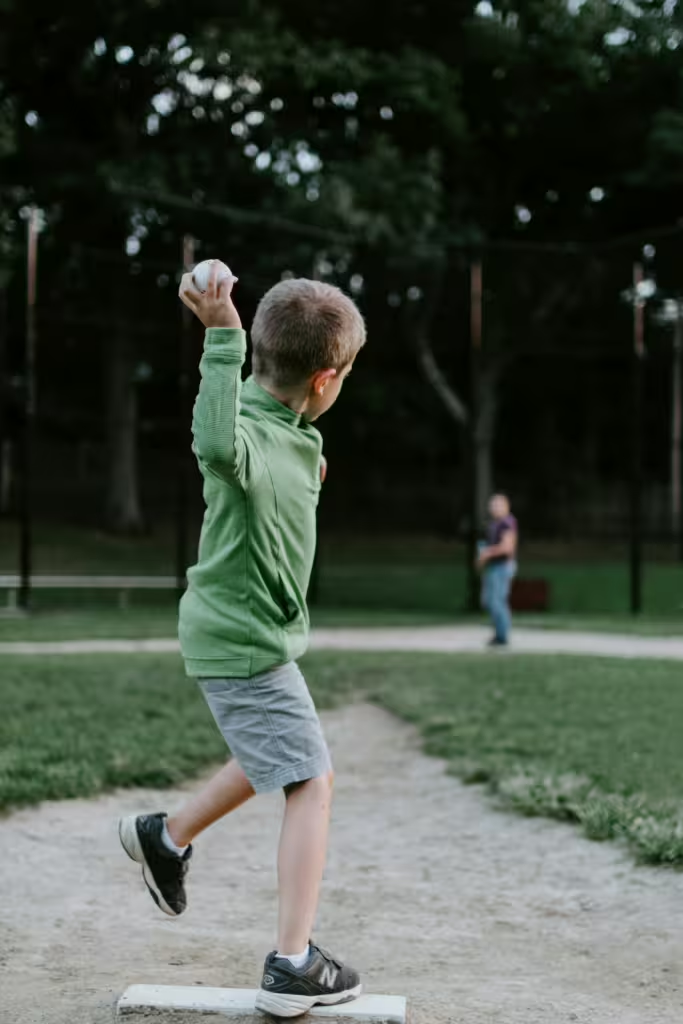Being a champion is quite a lofty goal for a child to have. Whether their dream is to compete in the Olympics, winning a championship, or just becoming the best athlete they can be, they are sure to face some trials and difficulties along the way.
One of the best ways for a child to succeed in anything, sport or otherwise, is to create and stick to a routine. Building a solid daily routine is widely recognized as one of the most important steps to success, but it’s not always easy for a kid to achieve on their own. Sometimes they need a little help or motivation from parents, friends, coaches, or even their sports idols.
Indeed, many professional athletes will tell you that it’s not just about talent or even practice—it’s about the every day habits that you build into your routine. A person’s daily routine, from how and when they wake up in the morning to the time they go to bed, can make a huge difference in their progress and success in sports. Sure, parents know how to stick their kids to a schedule for practice and the like, but it isn’t just about those times; not really, anyway.
In this article, we will go through key habits that you and your kid can incorporate into your routine in order to help them be successful. We will teach you to teach them how to train like a champion so that, win or lose, they can become the best athlete they can be.
Set Your Goals and Visualize Success
A champion’s journey should begin with a clear vision of what they hope to achieve. Every successful athlete has specific goals they work towards, and they think about these goals often. Thus, it’s important that you and your child discuss their goals so that you can incorporate goal-setting and visualization into their routine. Some effective ways to achieve this can be found below:
Set Clear, Achievable Goals: Whether it’s improving their jump shot, making three-pointers, running a faster mile, hitting a home run, or learning a new gymnastics move, teach your kids to set realistic goals for themselves. They aren’t going to get to the World Series next week, so it’s important to keep expectations grounded at this stage.
That’s not to say that they shouldn’t reach for the stars, they just need to build the ladder first. A good way to do this is to have your kid write down their immediate goals and break them into smaller steps that they can then work on each day.
Visualize Success: Have your child take a few minutes each morning or before practice to imagine themself achieving their goals. If need be, sit with them and talk them through the process. Help them to picture themself making the perfect pass, scoring a goal, or sticking that landing or dismount in gymnastics. Visualization helps our brains to prepare for real-life action and can work wonders in making your child feel more confident and prepared for what’s to come.
Tip: Have your child keep a “Goal Journal” where they write down your short-term and long-term goals, athletic or otherwise. Make sure they update it with results and new goals as they improve!
Start the Day with a Balanced Breakfast
When it comes to playing sports, our bodies are our engines—they need fuel to run at their best. As good parents, you have always made sure to have your kid start their day with a balanced breakfast, but that becomes even more important when we know they are going to be working their butts off on the sports field later in the day. Starting the day with a balanced breakfast gives kids the energy they need for practice, meets, and even school.
- Include Protein, Carbs, and Healthy Fats: Protein from foods like eggs, yogurt, or nuts helps repair spent muscles, while whole grains and fruit provide long-lasting energy throughout the day.
- Stay Hydrated: Make sure your kid is hydrated! We’ve suggested it time and time again and we will continue to do so until it sticks! Starting the day with a glass of water to keep the body hydrated and ready for action. Staying hydrated also helps kids to stay mentally focused and play at peak performance.
- Example Breakfast Ideas: Whole-grain toast with peanut butter and banana, oatmeal with berries and nuts, or a scrambled egg wrap with veggies.
Get into a Daily Stretching Routine
Young athletes should be warming up before every practice and game, but keeping that physical flexibility even during off hours is a great way to prevent injuries and improve performance over time. Parents should try and build a stretching routine into their kid’s day if the schedule allows. This will keep muscles loose, improve their range of motion, and keep them feeling great.
- Morning Stretch: A quick stretch in the morning can help wake up muscles and improve posture. Kids can also try a mix of gentle stretches, like shoulder rolls, neck stretches, and toe touches.
- Pre-Workout and Post-Workout Stretching: Before practice or a game, have your child do dynamic stretches like leg swings or arm circles to warm up. Afterward, have them cool down with static stretches, holding each stretch for 15–30 seconds. This is likely something a good coach will already employ, so keep informed about what your child is already doing stretchwise as part of their team’s routine.

Practice with Purpose
When it comes to reaching one’s goals, it’s not just about practicing a lot; it’s about practicing with purpose. Champions don’t just go through the motions—they put their focus and energy into every drill, every play, and every repetition. Therefore, it’s very important that kids go into practice with the right mindset whenever possible.
- Set a Focus for Each Practice: Before your kid starts, have them think about one or two skills they may want to improve during that practice session. This could be something as simple as working on their balance in gymnastics, their speed in soccer, or their swing accuracy in baseball.
- Give 100% Effort: Champions push themselves to do their best in every drill, even if it’s tiring, so encourage that mindset in your kids. That’s not to say you need to be mean about it, but you should inspire them to do their best whenever they have it in them. The truth is, practicing with full effort trains the body and mind to handle challenges better.
- Seek Feedback: If your kid is struggling, tell them to be open about it. Young athletes should feel free to ask their teammates and coaches for feedback. They can help spot areas for improvement and offer tips to help you succeed.
Keep Your Mind Sharp with Mental Training
There are those who say that most of sports is played in the mind, and to a degree, that much has always been true. Sports have never just been about physical strength; they require mental acuity and flexibility as well. Building mental habits like focus, resilience, and a positive attitude can help young athletes to stay calm and confident under pressure.
- Focus Exercises: Try to have your child meditate. Spending a few minutes each day practicing deep breathing or mindfulness can help improve concentration and reduces stress.
- Positive Self-Talk: When things get tough, it’s easy for children to feel discouraged. This is where we come in. As parents we want to encourage positive self-talk, not negativity. It’s important to remind them about their strengths and recognize all the hard work they have already put in. Moreover, it’s important that they reconcile these things themselves, internally.
- Reflect on Your Progress: At the end of each week, take a few minutes with your child to think about what they did well and the areas where they think they could improve. Don’t forget to involve the journal again, have your kids write down any lessons they learned and check off any goals they achieved.
Get Quality Sleep Every Night
Sleep is so important for a young person. Heck, it’s one of the most important parts of anyone’s daily routine. As we sleep, our bodies repair muscle, restores energy, and prepares our brain for the next day. Getting enough quality sleep helps us to feel fresh, alert, and ready to take on any challenge; especially those that we have set for ourselves.
- Aim for 8–10 Hours of Sleep: Kids and young athletes need a bit more sleep than adults. Try to get them to bed early so that they have at least 8 hours each night.
- Have a Bedtime Routine: Try to keep your kid in a rhythm by making sure they go to bed and wake up at the same time every day. This helps your body develop a natural rhythm. Also, try to instill a normal bedtime routine, like reading or listening to calming music. This can make falling asleep even easier.
- Avoid Screens Before Bed: Tuck the phone and tablet away before bed! Take it out of the room if you can! The blue light from phones and tablets can make it harder for any of us to fall asleep. So no more screentime before bedtime!
Fuel Up with Nutritious Snacks
Healthy snacks are a great way to give kids a quick burst of energy between meals and helps their body stay strong and ready for training. Parents should make sure to have nutritious snacks on hand.
- Choose Snacks with Protein and Carbs: Protein is great for helpings tired muscles recover, and carbs provide energy. Try giving your kids snacks like yogurt with fruit, a smoothie, or a handful of trail mix.
- Stay Hydrated: Young athletes need a water bottle on hand that can help them stay hydrated throughout the day.
- Snack Ideas: String cheese and apple slices, hummus and veggie sticks, or whole-grain crackers with peanut butter.
Cross-Train and Work on Different Skills
Cross-training might be a little advanced for younger children, but it’s a perfectly viable way of practicing different types of exercises and sports if your child is more advanced. It works like this: say your child plays basketball, you might also have them practice swimming, running, or yoga at the same time. This cross-training technique can be used to help young athletes build different muscles, improve coordination, and prevent injuries.
- Mix Up Your Workouts: Try adding exercises like swimming, cycling, or hiking to your kid’s routine. These activities will help them build endurance and give their main muscles a break. Don’t let them overdo it or anything, just have them mix it up.
- Work on Flexibility and Strength: Yoga and strength training are great for any athlete, young or old. It builds a strong core and helps them practice mindfulness. It can also improve balance, stability, and control.
Find Inspiration from Champions
Reading about other champions or watching their routines can motivate a child to reach their sometimes lofty goals. It may also help to teach them valuable lessons about perseverance, dealing with setbacks, and becoming champions in their own right. From famous athletes to role models in your community, learning from others can give young athletes new ideas and keep them inspired, even when things look tough.
- Watch Videos of Your Favorite Athletes: Teach your kid to notice how professional athletes prepare for their own games, handle challenges, and celebrate their wins.
- Read Biographies or Articles: Reading about the journeys of successful athletes can show kids the ups and downs of their paths to success. And frankly, anything that gets a child to read anything should be helpful to parents!
- Stay Positive: We all know that champions believe in themselves, even when things are tough. Have your child reflect on that mindset and think about what they admire in their role models. This will help them to develop those qualities in themselves.
Stay Committed to Your Routine
It’s not always easy to stick to a routine or to feel motivated when the chips are down, but champions know that dedication leads to success. Nevertheless, it’s up to parents to keep the routine consistent, no matter what. If they do this, they should see improvement in their skills, strength, and mindset.
- Be Patient: Results don’t happen overnight. Improvement takes time, so tell your kids to trust the process and stick to the plan.
- Adjust When Needed: If something isn’t working, it’s okay to change the routine. Try and explain te concept of pivoting when something needs to be altered.
- Celebrate Your Progress: Every step forward is a step toward their goals. Parents can help their kids keep track of their progress and celebrate how far they have come.

Cultured Athlete Says…
Creating a champion’s routine is about building small daily and sticking to their routine. Building good habits add up over time and can fuel success. In order to accomplish this, parents need to fuel their kids with positivity, guidance, hydration, healthy food, and sleep. Still, much of their eventual success will ultimately be up to the child and how they work towards their goals. Hopefully this article helped in putting kids and parents on the right path.
Discover more from CulturedAthlete
Subscribe to get the latest posts sent to your email.






